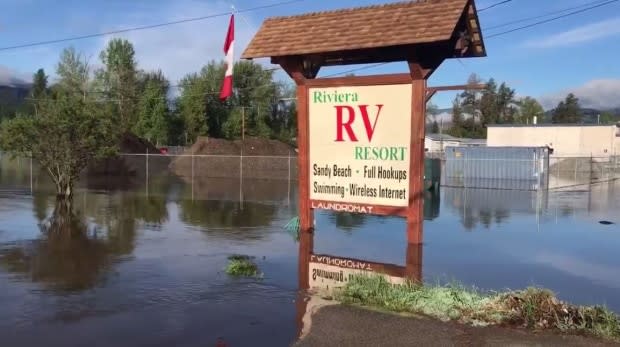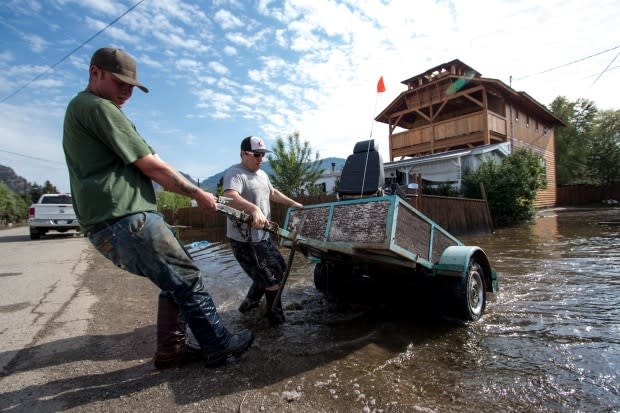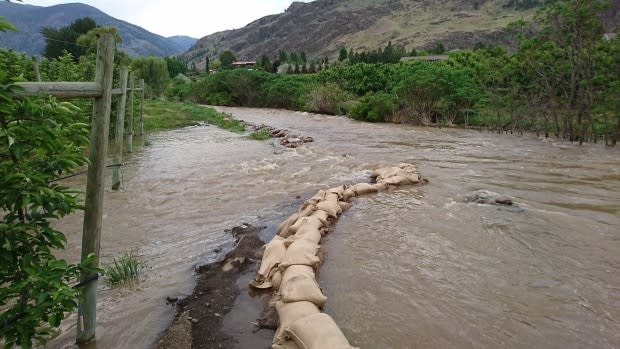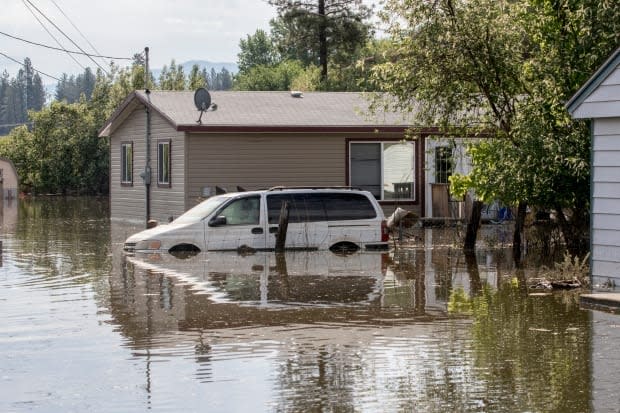'We're going to see more of this': Spring flooding in B.C. may be worsened by logging practices

Brian Thate never planned on starting his life over. That is, until the floodwaters hit.
His small Grand Forks, B.C., family business — the Riviera RV Park — was devastated by historic flooding in 2018, leading him and his wife to sell the property earlier last year.
Between cleanup costs and the devaluation of his property, Thate estimates his family lost more than half a million dollars. They ran the business for more than two decades.
"Our retirement plans have changed — I know I'll be working for as long as I can work to feed our family," he told CBC News. "And we're supporting others that are still trying to recover."
The convergence of extremely heavy snowpacks, sudden downpours and unseasonably warm temperatures were all factors in the historic flood that swept through Grand Forks and other parts of British Columbia's southern Interior in 2018.
But some argue that the deforested landscape, where melting snow is exposed to direct sunlight, likely exacerbated river overflows.

Logging companies in B.C. aren't legally required to consider downstream flooding when they harvest trees in watersheds. But forestry experts say that the mass clear cuts they often leave behind could partly be to blame.
According to Doug Wahl, a manager of audits and investigations for the B.C. Forestry Practices Board, forestry is a likely contributor to flooding events, particularly in areas that were hit by the pine beetle.
"Because of the accelerated rate of harvesting that was really necessary to salvage those stands and make good use of them, the result has been some pretty large openings on the land base," said Wahl.

"You have that snow melting off sooner in the spring time as opposed to snow that might be under trees and it's sheltered and it melts slower ... and you're getting generally larger amounts of snow or water in a shorter period of time, causing flooding in downstream areas, like agricultural land or residential land," he said.
B.C. urged to update land-use planning
Some professional foresters are calling on the province to determine the precise impact logging and other land use has had on seasonal flooding — to prevent history from repeating itself.
"We're going to see more of this, with climate change," said Anthony Britneff, a retired senior official for the B.C. Forest Service.
Britneff suggested the government hire experts to write so-called cumulative effects assessments, which are reports that determine the impact human activities and natural disturbances have on public resources. The reports are made public, and help inform better management practices.
He also urged the province to update land-use plans with community input.

Meanwhile, the province says it's looking into links between logging and high-risk flooding areas along the Kettle River and St. Mary's River in the southern Interior. There's also an ongoing assessment of stream and river flows across the province. Both studies will be made public this year.
Britneff thinks the reports should lead to "legally binding" changes to land-use and forest management near affected communities. But there are still questions as to what legal ramifications any of those studies will have.
According to the province, the reports do not "create new legislative requirements."

The province's forestry watchdog has raised concerns over the lack of legal obligations major forestry companies have to consider downstream flooding when harvesting watersheds.
The B.C. Forest Practices Board investigates public complaints and audits foresters across the province. Since 2013, about 22 per cent of its investigations have included concerns surrounding harvesting watersheds.
No legal requirement
According to a 2019 FPB report, "there is no legal requirement for licensees to consider downstream private property or road infrastructure."
Further, a 2014 bulletin from the board says "forest licensees are more willing to accept some risk from harvesting and associated activities, since most of the direct benefits and few consequences accrue to them."
The forest practices board is urging foresters to follow a set of voluntary guidelines.
Meanwhile, research conducted by University of B.C. forest management professor Younes Alila suggests that logging at higher elevations in mountains areas can dramatically increase the frequency of flooding events downstream. Alila says many of those regions have been aggressively logged following the pine beetle infestation.
"We're going to continue to see an increase in the flood risk for decades to come," said Alila "The effect of logging on floods — it's going to be long lasting because the regrowth of the trees and the recovery are slow by nature."

Researchers like Alila think industry will need to be held to a higher standard in order to both protect communities and preserve the landscape.
"For a long time, we have underestimated the effect of logging on the flood regime, he said.
"The government has given free rein to the industry to do whatever they want, to a large extent, and no one is being held accountable," he added.


